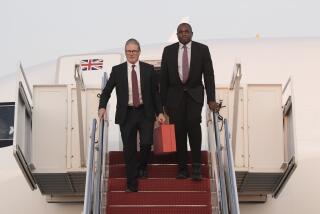Pre-Summit Weapons Talks Open With U.S. Protest on Daniloff Case
- Share via
WASHINGTON — A special round of U.S.-Soviet arms control talks began on a low key Friday despite a statement of protest by the American delegation against the jailing of U.S. reporter Nicholas Daniloff in Moscow, State Department officials said.
The talks, called to prepare for a summit between President Reagan and Soviet leader Mikhail S. Gorbachev, are intended to discuss the superpowers’ basic concepts of nuclear arms issues, officials said.
A State Department spokesman said that the chief of the U.S. delegation at the two-day meeting, Paul H. Nitze, read a statement objecting to Daniloff’s imprisonment on what the United States calls a trumped-up spy charge.
Officials refused to divulge the contents of the statement or the Soviet response. But they said that the talks, in a small conference room on the top floor of the State Department building, moved on quickly to arms control issues.
The meeting is one of a series of U.S.-Soviet talks aimed at finding areas of possible agreement for a summit, which both leaders have said they would like to see before the end of the year. The talks are intended to pave the way for a scheduled Sept. 19-20 meeting between Soviet Foreign Minister Eduard A. Shevardnadze and Secretary of State George P. Shultz, which will focus largely on a date and agenda for the summit meeting.
Focused on Arms Control
Officials who refused to be quoted by name said the talks focused Friday--and will again today--on the broad arms control concerns of each government, such as the Reagan Administration’s desire for a long-term transition from offensive nuclear arsenals to defensive systems. They said that formal and detailed negotiations toward a new strategic arms agreement would be reserved for other talks that are scheduled to resume Sept. 18 in Geneva.
Gorbachev has said that the Soviet Union wants to see concrete progress on arms control before a Reagan-Gorbachev meeting. Reagan Administration officials, on the other hand, have said that a summit meeting must take up issues involving human rights and Third World conflicts as well as arms control.
Viktor P. Karpov, head of the Soviet delegation, was asked as he entered the State Department building whether an agreement could be reached during the meetings.
“We are prepared to reach an agreement if there is readiness on the American side,” he replied.
More to Read
Sign up for Essential California
The most important California stories and recommendations in your inbox every morning.
You may occasionally receive promotional content from the Los Angeles Times.











